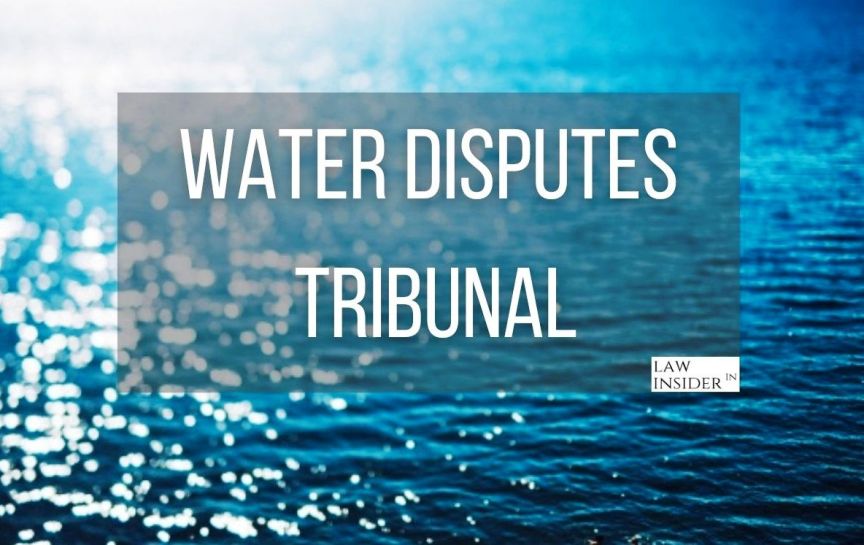Shubhangi Singh
India has seen protracted river water sharing disputes in recent years. Depleting groundwater, drying rivers and increasing demand for water have led to long legal wrangles between warring states. But very soon, India might have a single national tribunal — the Inter-State River Water Disputes Tribunal — to arbitrate inter-state water disputes. Its recommendations will be binding on the competing parties.
Over the years, there have been several tribunals hearing disputes between states on river water sharing, but they have not been effective in resolving disputes in a time-bound manner. While there are suggestions for reconsidering and reviewing the structuring and functioning of the tribunals, there is also a need to look for an alternative mechanism, based on environmental thinking, to resolve such disputes effectively, amicably and sustainably.
Water in the Indian Constitution
- Water is in the State List. It is Entry 17 of the list and hence, states can legislate with respect to rivers.
- Entry 56 of the Union List, however, gives the Central government the power to regulate and develop inter-state rivers and river valleys.
- Article 262 also states that the Parliament may provide for the adjudication of any dispute or complaint with respect to the use, distribution or control of the waters of, or in, any inter-State river or river valley.
- As per Article 262, the Parliament has enacted the following:
- River Board Act, 1956: This empowered the GOI to establish Boards for Interstate Rivers and river valleys in consultation with State Governments. Till date, no river board has been created.
- Inter-State Water Dispute Act, 1956: Under this act, if a state government or governments approach the Centre for the constitution of a tribunal, the government may form a tribunal after trying to resolve the dispute through consultations.
River Water Tribunal Composition
The tribunal consists of the Chief Justice of India, a sitting judge from the Supreme Court, and two other judges who are from either the SC or a High Court.
Inter-State River Water Disputes
Currently in India, water disputes resolution is governed by the Inter-State Water Disputes Act, 1956. As per this law, the state governments can approach the centre for a tribunal for the resolution of a water dispute. The decision of the tribunal is final.
Some of the Inter-State Water Disputes and States Involved:
- Narmada Water Dispute- Gujarat, Maharashtra, Madhya Pradesh and Rajasthan
- Mahi River Dispute- Gujarat, Rajasthan and Madhya Pradesh
- Ravi and Beas Water Dispute- Punjab, Haryana, Himachal Pradesh, Rajasthan, Jammu and Kashmir and Delhi
- Satluj-Yamuna Link Canal Dispute- Punjab, Haryana and Rajasthan
- Yamuna River Water Dispute- Uttar Pradesh, Haryana, Himachal Pradesh, Punjab, Rajasthan, Madhya Pradesh and Delhi.
- Karmnasa River Water Dispute- Uttar Pradesh and Bihar
- Barak River Water Dispute- Assam and Manipur
- Cauvery Water Dispute- Tamil Nadu, Kerala and Karnataka
- Krishna Water Dispute- Maharashtra, Karnataka and Andhra Pradesh
- Tungabhadra Water Dispute- Andhra Pradesh and Karnataka
- Aliyar and Bhivani River Water Dispute- Tamil Nadu and Kerala
- Godavari River Water Dispute- Andhra Pradesh, Odisha, Chattisgarh, Karnataka, Madhya Pradesh
Inter-State River Water disputes (Amendment) Bill, 2019.
The Union Cabinet has approved the Inter-State River Water Disputes (Amendment) Bill, 2019 that will help adjudicate disputes relating to waters of inter-State rivers and river valleys. A version of this bill was first introduced in the Lok Sabha in 2017 but subsequently lapsed. The Bill seeks to amend the Inter State River Water Disputes Act, 1956 with a view to streamline the adjudication of inter-state river water disputes and make the present institutional architecture robust.
Features of the bill:
- Disputes Resolution Committee: The Bill requires the central government to set up a Disputes Resolution Committee (DRC), for resolving any inter-state water dispute amicably. The DRC will get a period of one year, extendable by six months, to submit its report to the central government.
- Members of DRC: Members of the DRC will be from relevant fields, as deemed fit by the central government.
- Tribunal: The Bill proposes to set up an Inter-State River Water Disputes Tribunal, for adjudication of water disputes, if a dispute is not resolved through the DRC. This tribunal can have multiple benches. All existing tribunals will be dissolved and the water disputes pending adjudication before such existing tribunals will be transferred to this newly formed tribunal.
- Composition of the Tribunal: The tribunal shall consist of a Chairperson, Vice-Chairperson, and not more than six nominated members (judges of the Supreme Court or of a High Court), nominated by the Chief Justice of India.
Conclusion:
There are about a dozen tribunals that now exist to resolve disputes among States on sharing water from rivers common to them. The standalone tribunal so envisaged will have a permanent establishment and permanent office space and infrastructure so as to obviate with the need to set up a separate Tribunal for each water dispute, a time consuming process.
The Bill also proposes a Dispute Resolution Committee set up by the Central Government for amicably resolving inter-State water disputes within 18 months. Any dispute that cannot be settled by negotiations would be referred to the tribunal for its adjudication. The dispute so referred to the tribunal shall be assigned by the chairperson of the tribunal to a Bench of the tribunal for adjudication.
The Bill can also affect the composition of the members of various tribunals, and has a provision to have a technical expert as the head of the tribunal. Currently all tribunals are staffed by members of the judiciary, nominated by the Chief Justice.

